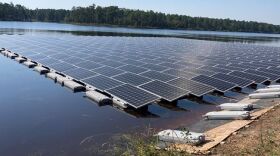David Boraks
David Boraks is a WFAE weekend host and a producer for "Charlotte Talks." He's a veteran Charlotte-area journalist who has worked part-time at WFAE since 2007 and for other outlets including DavidsonNews.net and The Charlotte Observer.
-
A 2022 study found that more than 750 structures along the North Carolina coast were at risk, with no dunes or vegetation between them and the ocean.
-
The National Oceanic and Atmospheric Administration predicts coastal communities nationwide will average 45 to 85 high-tide flooding days per year by 2050, or 10 times the current rate, and some places could see even more.
-
At UN climate talks, the global community is looking at tripling the amount of renewables coming online. In the U.S., that's meant a push into offshore wind — but it's been met with fits and starts.
-
There's lots of talk these days about replacing gas appliances with electric ones, to help cut our use of fossil fuels that cause global warming. Gas companies have another idea - buy carbon offsets.
-
Environmental groups are asking the North Carolina Court of Appeals to overturn Duke Energy's new rates and rules for residential rooftop solar panels that took effect October 1st.
-
Coastal experts say North Carolina lacks the money and laws it needs to deal with hundreds of beachfront houses at risk of collapsing into the Atlantic Ocean because of sea level rise and erosion.
-
State officials have delayed approving an expansion for a wood pellet plant in northeastern North Carolina while they consider concerns about how the plant affects the environment and nearby communities of color.
-
The U.S. wants to mine more domestic lithium for electric vehicle batteries. It would require demolishing houses, digging up farms and disrupting streams. Some residents worry about the impact.
-
The U.S. wants to mine lithium for electric vehicle batteries to meet climate change goals. But residents near a proposed open-pit mine object.
-
There's a big market sending U.S. wood pellets to Europe to burn as clean energy. But critics say they're not climate-friendly, and their production poses a health hazard for low-income communities.







